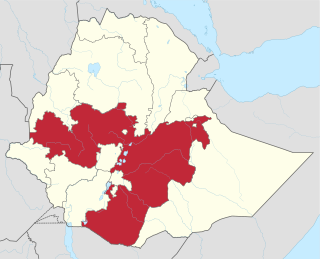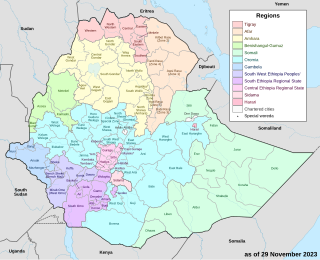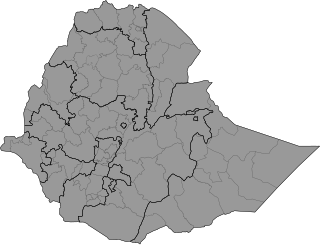
The politics of Ethiopia are the activities associated with the governance of Ethiopia. The government is structured as a federal parliamentary republic with both a President and Prime Minister. The government is multicameralism with a house of representative and a council. The term politics of Ethiopia mainly relates to the political activities in Ethiopia after the late 20th century when the democratization took place in the nation. The current political structure of Ethiopia was formed after the Tigrayan People's Liberation Front (TPLF) overthrew dictator President Mengistu Haile Mariam in 1991. General election was held in June 1994 and Ethiopia has maintained a multiparty political environment till today.

Oromia is a regional state in Ethiopia and the homeland of the Oromo people. The capital of Oromia is Addis Ababa.

Under the current constitution, Ethiopia conducts local, regional, and federal elections. At the federal level, Ethiopia elects a legislature. The Federal Parliamentary Assembly has two chambers: the House of People's Representatives with not more than 550 members as per the constitution but actually nearly 547 members, elected for five-year terms in single-seat constituencies; and the Council of the Federation with 117 members, one each from the 22 minority nationalities, and one from each professional sector of its remaining nationalities, designated by the regional councils, which may elect them themselves or through popular elections.

General elections were held in Ethiopia on 15 May 2005, for seats in the House of Peoples' Representatives and four regional government councils. Under pressure from the international community, Prime Minister Meles Zenawi promised that this election would be proof that more democracy would come in this multi-ethnic nation; international elections observers from the European Union (EU) and the U.S.-based Carter Center were present to observe the results. This election succeeded in attracting about 90% of the registered voters to the polls. A government ban on protests was imposed throughout the election period.
The Coalition for Unity and Democracy, commonly referred to by its English abbreviation CUD, or occasionally CDU; its Amharic abbreviation, used in Ethiopia, is Qinijit; in English writing often referred to as Kinijit) was a coalition of four existing political parties of Ethiopia which combined to compete for seats in the Ethiopian General Elections held on May 15, 2005, and around the end of that year, became a full-fledged political party. Its leader was Dr. Hailu Shawul. It dissolved in 2007.
Hailu Shawul was an Ethiopian politician and civil engineer who was the leader of the Coalition for Unity and Democracy (CUD) during the 2005 Ethiopian general election. He was also the leader of All Ethiopian Unity Party from 1996 to 2013. He died on 6 October 2016, while receiving treatment at a hospital in Bangkok, Thailand.

The Southern Ethiopian People's Democratic Movement (SEPDM) was a political party in Ethiopia. At the last legislative elections, 15 May 2005, the party was part of the Ethiopian People's Revolutionary Democratic Front, that won 327 out of 527 seats in the Council of People's Representatives.

The Sheko and Mezenger People's Democratic Unity Organization is a political party in Ethiopia. At the last legislative elections, 15 May 2005, the party elected Kassahun Jarka Ziyatu to represent a district in the Bench Maji Zone of the Southern Nations, Nationalities, and Peoples Region (SNNPR).

Konso is a zone in the Southern Nations, Nationalities, and Peoples' Region, Ethiopia. It was formerly a woreda. Prior to 2011, Konso was not part of any Zone in the SNNPR and was therefore considered a special woreda, an administrative subdivision which is similar to an autonomous area. In 2011, the Segen Area Peoples Zone was established, which includes Konso special woreda and the 3 former woredas surrounding it. This special woreda is named after the Konso people. Located in the Great Rift Valley, Konso is bordered on the south by the Oromia Region, on the west by the South Omo Zone, on the northwest by Alle special woreda, on the north by Dirashe special woreda, on the northeast by Amaro special woreda, and on the east by Burji special woreda. The Sagan River, which flows south then west to join the Weito, defines part of the woreda's boundary with Burji and the entire length of the boundary with the Oromia Region. The administrative center is Karati; other towns in Konso include Fasha and Sagen. After protesting by residents to become a zone for several years, Konso became a zone in November 2018.

Ethiopia is administratively divided into four levels: regions, zones, woredas (districts) and kebele (wards). The country comprises 11 regions and two city administrations under these regions, plenty of zones, woredas and neighbourhood administration: kebeles. In addition to the nine federal states within the country, there are two federal-level city administrations in Addis Ababa and Dire Dava.
Leemo is one of the woredas in the Southern Nations, Nationalities, and Peoples' Region of Ethiopia. The relationship of the name of this woreda to that of the medieval kingdom in the Gibe region is unclear. A part of the Hadiya Zone, Limo is bordered on the south by the Kembata Tembaro Zone, on the southwest by Duna and Soro, on the west by Gomibora, on the northwest by Misha, on the northeast by Ana Lemo, and on the southeast by Shashogo. Towns in Lemo include Belesa and Lisana. The town of Hosaena is surrounded by Limo. Parts of Limo woreda were separated to create Ana Lemo, Hosaena, Mirab Azernet Berbere and Misraq Azernet Berbere woredas.
Soro is one of the woredas in the Southern Nations, Nationalities, and Peoples' Region of Ethiopia. Part of the Hadiya Zone, Soro consists large population of Hadiya and Danta dubamo people, bordered on the south by the Kembata Tembaro Zone, on the southwest by the Dawro Zone, on the west by the Omo River which separates it from the Oromia Region, on the north by Gomibora, on the northeast by Limo, and on the southeast by Duna. The administrative center of this woreda is Gimbichu; other towns in Soro include Jajura. Parts of Soro were separated to create Duna and Gomibora woredas.
Naannawa Ambo is one of the districts in the Oromia of Ethiopia. Part of the West Shaggar Zone, it is bordered on the southwest by Gurraacha Enchini, on the west by Cheliya, on the north by Kutaye-Liban, on the northeast by Jeldu, on the east by Dendi, and on the southeast by the Southwest Shewa Zone. The administrative center of this woreda is Ambo; other towns include Gorosile and Meti. Ambo Zuria and Toke Kutaye woredas and Ambo town were part of former Ambo woreda.
Lidetu Ayalew is an Ethiopian politician who is the founder and the leader of the Ethiopian Democratic Party. He was a deputy chairman and chief spokesperson of Coalition for Unity and Democracy (CUD), during the 2005 Ethiopian general election.

The Oromo People's Congress (OPC) was a federalist and Oromo nationalist opposition political party in Ethiopia. It was founded in April 1996 as the Oromo National Congress by Merera Gudina, who was its chairman. However, the party licence and name were allegedly given to a marginal splinter group by the National Election Board of Ethiopia in order to undermine the party and create confusion among the voters after the May 2005 election, so the party was forced to change its name to Oromo People's Congress prior to the 2008 by-elections. OPC merged with Oromo Federalist Democratic Movement (OFDM), forming the Oromo Federalist Congress (OFC), in 2012.

The Transitional Government of Ethiopia (TGE) was an era established immediately after the Ethiopian People's Revolutionary Democratic Front (EPRDF) seized power from the Marxist-Leninist People's Democratic Republic of Ethiopia (PDRE) in 1991. During the transitional period, Meles Zenawi served as the president of the TGE while Tamrat Layne was prime minister. Among other major shifts in the country's political institutions, it was under the authority of the TGE that the realignment of provincial boundaries on the basis of ethnolinguistic identity occurred. The TGE was in power until 1995, when it transitioned into the reconstituted Federal Democratic Republic of Ethiopia that remains today.
Alemu Abebe is an Ethiopian politician. He served as mayor of Addis Ababa during the years of Red Terror.

The presidential election held on 7 October 2013, was the fourth presidential election of the Federal Democratic Republic of Ethiopia to elect the country's third president. Mulatu Teshome was elected by the parliament to a six-year term. Incumbent president Girma Wolde-Giorgis was barred from seeking re-election due to term limits.

Tamerat Negera is an Ethiopian journalist, analyst, and a commentator on Ethiopian politics. He was born in Addis Ababa, Ethiopia to his mother Daditu Tucho Jote and his father Seargent Negera Feyisa Gurara. He is married to Weyzero Selam Belay since 2019.

The 1995 Ethiopian Federal Constitution formalizes an ethnic federalism law aimed at undermining long-standing ethnic imperial rule, reducing ethnic tensions, promoting regional autonomy, and upholding unqualified rights to self-determination and secession in a state with more than 80 different ethnic groups. But the constitution is divisive, both among Ethiopian nationalists who believe it undermines centralized authority and fuels interethnic conflict, and among ethnic federalists who fear that the development of its vague components could lead to authoritarian centralization or even the maintenance of minority ethnic hegemony. Parliamentary elections since 1995 have taken place every five years since enactment. All but one of these have resulted in government by members of the Ethiopian People's Revolutionary Democratic Front (EPRDF) political coalition, under three prime ministers. The EPRDF was under the effective control of the Tigray People's Liberation Front (TPLF), which represents a small ethnic minority. In 2019 the EPRDF, under Abiy, was dissolved and he inaugurated the pan-ethnic Prosperity Party which won the 2021 Ethiopian Election, returning him as prime minister. But both political entities were different kinds of responses to the ongoing tension between constitutional ethnic federalism and the Ethiopian state's authority. Over the same period, and all administrations, a range of major conflicts with ethnic roots have occurred or continued, and the press and availability of information have been controlled. There has also been dramatic economic growth and liberalization, which has itself been attributed to, and used to justify, authoritarian state policy.








